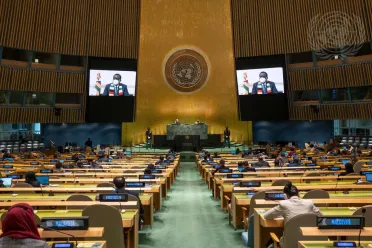Statement
Statement summary
EMMERSON DAMBUDZO MNANGAGWA, President of Zimbabwe, said that vaccine nationalism was a self-defeating approach that contradicted the mantra “no one is safe until everyone is safe”. He underscored that this year would be crucial for the achievement of the Sustainable Development Goals with the organization of a biodiversity summit, the second Global Sustainable Transport Conference and the Nutrition for Growth Summit. He also welcomed the upcoming High-Level Dialogue on Energy as an opportunity to explore viable renewable and green energy solutions, adding that Zimbabwe and the Southern African nations continued to suffer from the devastating impact of climate change while being among the least polluting regions. The upcoming COP26 must be an opportunity to take concrete actions and offer additional financial support to deliver on the 2030 Agenda.
Pointing to the initiatives carried by the Government, such as the land redistribution programme and increased support for farmers, he highlighted the positive results which led to more sustainable incomes for farmers in rural areas. In that regard, the United Nations Food Systems Summit was a useful platform for new actions and innovative solutions. In its “Vision 2030”, Zimbabwe aims to improve the lives of its citizens by sustainably managing the environment and creating decent jobs. These initiatives have made his country one of the fastest movers in the World Bank ease of doing business index.
He went on to say that the Government has approved the visit of the United Nations Special Rapporteur to Zimbabwe in October of this year to investigate the negative impacts of the unilateral coercive measures on the enjoyment of human rights. He requested the international community to remove the illegal sanctions, adding that he was grateful to the Southern African Development Community (SADC), the African Union and other nations who have continued to support Zimbabwe.
Underlining the constant threat of terrorism, he stressed that peace and stability in the SADC region were endangered. The solution laid in the hands of African nations with initiatives, such as the “Silencing the Guns” programme. Referring to the International Day for the Total Elimination of Nuclear Weapons during the high-level week, he invited nations to collaborate to achieve a world free of nuclear weapons. As well, he expressed concerns about the rise of racial tensions, violence and hate crimes. The recent adoption of the resolution establishing the Permanent Forum of People of African Decent was commendable, he added.
Given the importance of human rights in the work of the United Nations, he encouraged the full implementation of United Nations resolutions to end all forms of colonialism and occupation. Strengthened multilateralism was needed. To that end, Zimbabwe supported the reform of the Security Council and the revitalization of the work of the General Assembly, he said.

